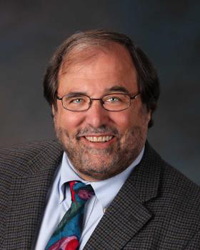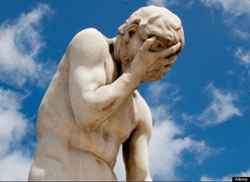FEAR OF DEATH IS THE REAL ENEMY SAYS ONCOLOGIST
Posted on 29 July 2013, 15:33
“...as for many of us, ego had dominated soul for lifetime. It had the grip of a vice rusted shut, clamped tight upon his psyche unto his last breath and heartbeat.”
So writes Dr. Stephen J. Iacoboni of one of his dying patients in his book The Undying Soul. After reading just the first chapter of this book, I was in such awe of the author’s writing and message that I assumed the book would be near the top of the best seller list, right up there with Dr. Eben Alexander’s Proof of Heaven. I didn’t realize at the time that the book was published in 2010. I had assumed it was a very recent release, and I was surprised to see that it was not highly ranked at Amazon.com However, I reserved further judgment until I was able to finish reading the book, after which I shook my head in bewilderment, still wondering why the book has not been a best seller. As I see it, it should be the first book read in every college philosophy and religion class. It should be required reading for every medical student, for every cancer patient, for every hospice patient, for every skeptic, for every pseudoskeptic, for everybody. I believe it goes to the very heart of the chaos we have in the world today.
Iacoboni (below) is an oncologist, who at the time of publication, had 28 years of experience and had witnessed many thousands of deaths, the majority of them people dying in a state of despair. He began his medical career as a hardcore atheist, commenting that “discussing a concept like soul was unthinkable.” Fresh out of medical school, he wanted “to prove that science and logic could triumph over anything – even cancer.” However, after establishing himself in his career, he began to realize that something was missing. Neither he nor his colleagues were able to offer any real comfort to those who had exhausted all medical treatment and were deemed terminal. He observed an “unspoken conspiracy of silence” relative to imminent death among his colleagues and patients. The medical approach to the spirit side of things was “not science, not our job.” As a result, many patients expired whimpering and with gnashing of teeth.

Iacoboni found that many cancer patients had unrealistic expectations and didn’t want their hopes dashed. They pleaded for or demanded a cure. While trying not to extinguish what little hope there might have been, Iacoboni tried to be more honest with them than other doctors. Most of the terminal patients were, however, unable to accept the truth of their condition and lived their remaining days in a state of despair.

“Never did we look for or try to save the soul of our patients,” Iacoboni offers. “We were supposedly among the most brilliant medical investigators in the world, and yet we had no knowledge of or interest in that which mattered most.”
As Iacoboni came to see it, the real enemy is the fear of death – “a fear that can only be overcome by recognition that we each have a soul that will never die.” He devotes separate chapters to different patients, using pseudonyms, of course, beginning with those who most feared death and died in anguish, before discussing several patients who quietly accepted their fate and departed with a puzzling serenity, seemingly even with eagerness and wonder.
Phillip, one of the patients in the first category, was 60 years old and had just retired from a career in computer technology when he was diagnosed with an aggressive case of non-Hodgkin’s lymphoma. “Like me, Phillip had long before abandoned religious faith in favor of modern science,” Iacoboni writes. “Unlike faith, however, science provides no refuge when hope is gone.” As Phillip’s condition deteriorated and he marched toward the abyss in “utter isolation,” Iacoboni felt helpless, unable to offer him any comforting words. It was Phillip’s spiritually-deprived death – so like many others he had attended – that prompted Iacoboni to search for answers outside of mainstream medicine. But he was so locked into the dogma of science that he didn’t know where to look. “It wasn’t so much the fact of their deaths that bothered me,” Iacoboni explains. “Rather it was the fact that they died without the comfort of finding peace with their hearts and souls before they passed on.”
He observed that so many people, so wrapped up in the “materialists’ narrow, spiritually crippling world view” had dismissed God in all the hustle and bustle of their everyday lives, then when facing imminent death, were desperate but didn’t know where to turn.
It was a man he calls Pavel from Ukraine who was to put Iacoboni “on the path toward discovering the undying soul. All through his treatment for leukemia, Pavel displayed a certain grace and serenity. “I had known other Christians who had faced their deaths fearlessly, but only a handful,” Iacoboni says, referring to Pavel, “Unfortunately, the majority of patients I’d watched die from cancer did not seem to derive significant comfort from their faith at the end…” But Pavel remained upbeat, happy and gracious right up until the time his physical body expired.” Moreover, Pavel rejected any sedatives, something Iacoboni had never witnessed and which he found “more mesmerizing than ten thousand ocean sunsets whereupon light fades to black.” As Pavel withdrew from his physical body, Iacoboni witnessed a “celestial” apparition, a manifestation that was very convincing to him.
Iacoboni goes on to tell of several other patients who died “mystically.” The evidence that he received was very subjective – he refers to it as “other-worldly” – and probably won’t be all that meaningful to most readers. What is meaningful is Dr. Iacoboni’s initial despair, his quest, his observations, his conversion and all of the wisdom that grew out of his spiritual awakening.
Michael Tymn is the author of The Afterlife Revealed: What Happens After We Die is published by White Crow Books. His latest book, Resurrecting Leonora Piper: How Science Discovered the Afterlife is now available on Amazon and other online book stores.
Paperback Kindle
Next blog post: August 12
|
Comments
Fear of dying is one of the painful states of mind. Epicurus (341-270 BCE) recognized this and urged his followers to believe that there is no afterlife, hence no fear of death. Believing that one will not die, that one has a soul, is yet another strategy for dealing with the natural fear. Belief in either nothingness or soul is comforting and mind-altering as one approaches death.But this is true, irrespective of the truth of the belief. Untrue beliefs have as much power as true beliefs. Maybe the good doctor wanted so much to be a help to his patients that his mind conjured up the apparitions. I’ve not read the book, but I doubt that I would find it convincing in any way. But, thanks, Mike, for sharing with us, as you always do, an wonderful review of an interesting book.
John F. Miller, III, Tue 13 Aug, 14:48

This books sounds very hopeful, and yes, it should be read by doctors.
When my husband had stage 4 colon cancer, his oncologist did not have the courage,
when I believe he should have, to tell him that he was dying and that he should enjoy
the rest of the time he had. My husband was a lovable kind of guy and I believe his physician felt so bad he just could not bear to tell him.
You see….all he had to offer was SCIENCE. And, that was not working!
My husband believed in his doctor, who would just say there were still many types of chemos
he could still offer him. After he took the strongest one for months first (never lost his hair and continued to work)it did nothing, they gave him two others types of chemos. One damaged his kidneys and the other put him
into cardiac arrest twice.
If the doctor had told him that he had done his best, I believe my husband would have not undergone these other chemos, he may have lived a little longer and enjoyed more of what time he had left doing enjoyable things.
I am the one who had to gently guide him on a spiritual pathway towards acceptance with courage, faith and hope towards his impending “physical” death.
Thank God, he had a basis of spiritual belief, he believed in Spiritist principles, which was extremely helpful. Yet, it’s one thing to believe it ,and another to have it put to the test.
He embraced his belief in an afterlife…we had many wonderful spiritual talks and we prayed a lot…I took care of him until the end. He “died” peacefully in our home.
He has communicated on quite a few occasions at our spirit sessions…and we all know it is him due to his quite distinctive and jovial personaity.
How wonderful when one has spiritual knowledge!
Yvonne Limoges, Tue 30 Jul, 17:25

Great post, Michael. I shall get the book.
I guess its inspirational books about cheating death that get to be best sellers. But this should be helpful to many people, nonetheless.
Robert McLuhan, Tue 30 Jul, 10:17

Add your comment
|